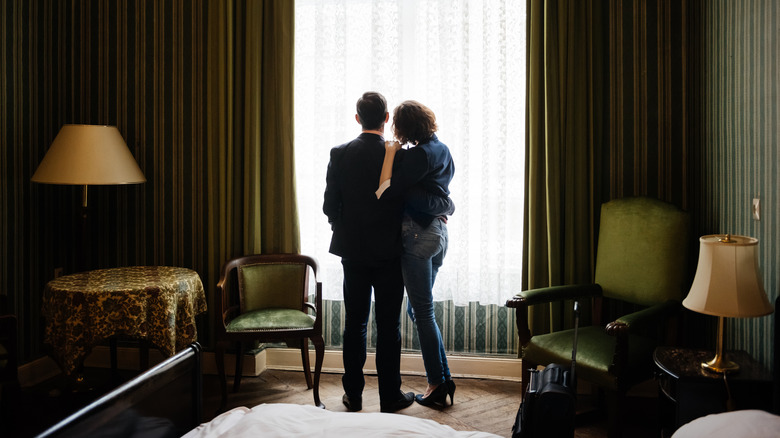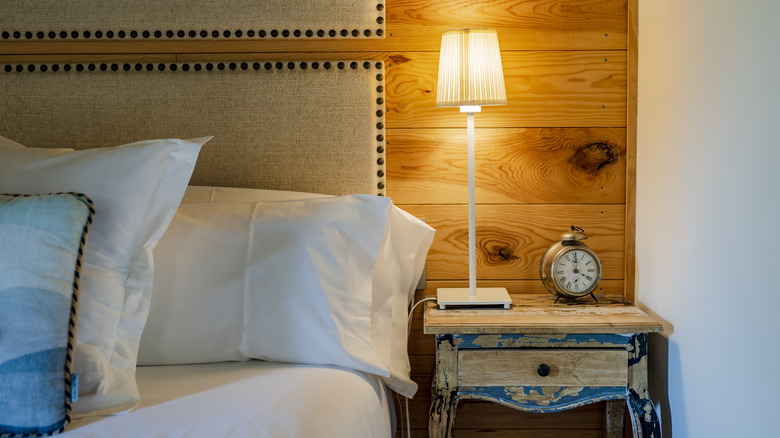American Tourists Have Noticed One Strange Thing That Hotels All Over Europe Lack
We may receive a commission on purchases made from links.
You check in at the front, and with the keys in hand, you open the door to your European hotel room. Small bed? Check. Tight corner closet? Check. Unusual half-door shower? Check. Alarm clock? ... For many American travelers, stepping into a European hotel room can feel like entering a whole new world with cozy decor, small yet efficient spaces, and continental-style breakfast buffets (that travel expert Rick Steves advises against). But there is one thing that catches Americans off guard: The conspicuous absence of a standard amenity they're used to back home — an alarm clock.
While alarm clocks have long been a staple of the bedside table in hotel rooms across the United States, they are curiously missing from many, if not most, hotels throughout Europe. You might wonder, "Where is the alarm clock?" and "Don't European travelers want to know what time it is?" Most importantly, how does one prepare for something like this on a trip abroad? The absence of alarm clocks in European hotel rooms isn't necessarily a matter of cost-cutting; after all, alarm clocks are quite cheap. Instead, it's a difference in hotel philosophy.
European hotels, especially budget accommodations and smaller boutique hotels, really focus on simplicity and efficiency. Unlike their American counterparts, which often include an array of gadgets and extras in the room, many European hotels only provide the essentials. Alarm clocks are widely considered unnecessary because most travelers today carry their own devices with built-in alarms, like smartphones or tablets. In fact, many guests prefer to rely on their phones to wake them up, as they're more familiar and customizable than a generic hotel alarm clock.
Why no alarm clocks and how to prepare for a European hotel stay
Plus, they glow, clutter the night table, and require regular replacement of batteries. With limited space, particularly in smaller European hotel rooms, every inch counts. Forgoing an item like an alarm clock makes rooms feel less cluttered and more minimalist. Additionally, many hotels have realized that alarm clocks often become more of a hassle than a help. Anyone who has ever fumbled with unfamiliar buttons or struggled to set an overly complicated clock — especially while jet-lagged — can attest to the stress that an unexpected wake-up call can bring.
It's worth noting that some upscale European hotels do still include alarm clocks in their rooms, particularly if they're catering to an international clientele who might expect it. These higher-end accommodations sometimes offer sleek, modern alarm clocks that double as docking stations or Bluetooth speakers. However, these are the exception rather than the rule, and they're more likely to be found in luxury chains and five-star properties.
If you can't bear the thought of not having a traditional alarm clock in your hotel room — hey, there's no shame in being old-school — it's best to plan ahead. The easiest solution is to use the alarm function on your smartphone. Otherwise, if you prefer a separate device, consider purchasing a small, portable clock like this Sharp Digital Alarm Clock or Travelwey Digital Travel Alarm Clock. These are easy to pack, simple to set, and won't rely on a power outlet. The last resort is to ask for a wake-up call, a courtesy many European hotels offer. Inform the reception desk of your preferred time, and they'll ring your room. Just remember, you're in Europe to explore, relax, and wake up on your own terms — with or without an alarm clock.

